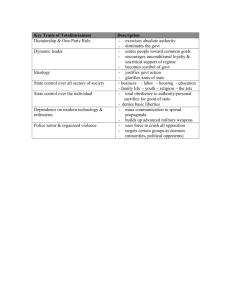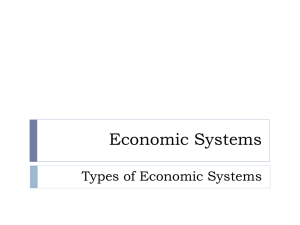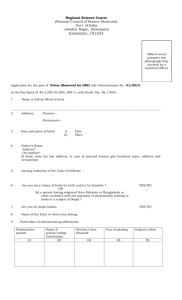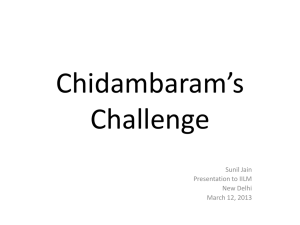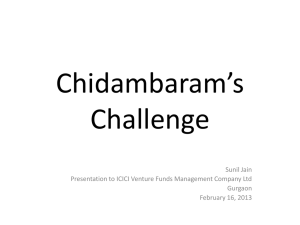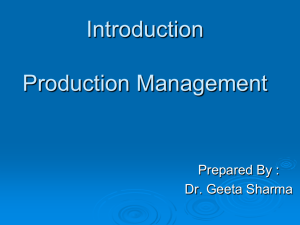GB sea power ensured triumph over FR - cutting - Course
advertisement
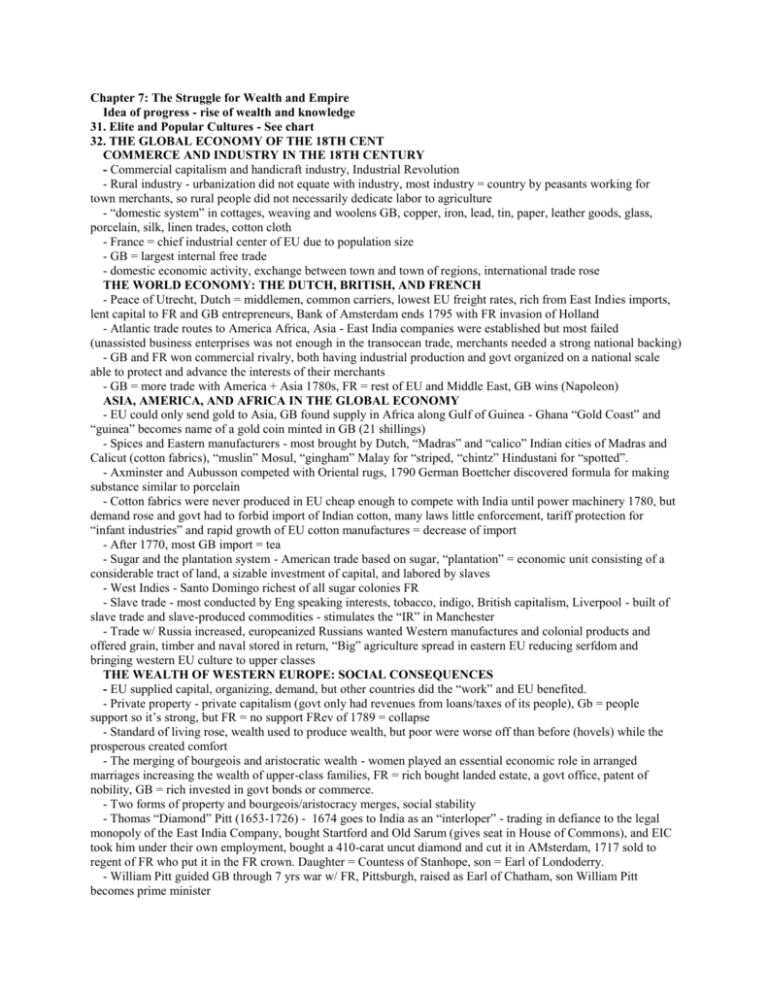
Chapter 7: The Struggle for Wealth and Empire Idea of progress - rise of wealth and knowledge 31. Elite and Popular Cultures - See chart 32. THE GLOBAL ECONOMY OF THE 18TH CENT COMMERCE AND INDUSTRY IN THE 18TH CENTURY - Commercial capitalism and handicraft industry, Industrial Revolution - Rural industry - urbanization did not equate with industry, most industry = country by peasants working for town merchants, so rural people did not necessarily dedicate labor to agriculture - “domestic system” in cottages, weaving and woolens GB, copper, iron, lead, tin, paper, leather goods, glass, porcelain, silk, linen trades, cotton cloth - France = chief industrial center of EU due to population size - GB = largest internal free trade - domestic economic activity, exchange between town and town of regions, international trade rose THE WORLD ECONOMY: THE DUTCH, BRITISH, AND FRENCH - Peace of Utrecht, Dutch = middlemen, common carriers, lowest EU freight rates, rich from East Indies imports, lent capital to FR and GB entrepreneurs, Bank of Amsterdam ends 1795 with FR invasion of Holland - Atlantic trade routes to America Africa, Asia - East India companies were established but most failed (unassisted business enterprises was not enough in the transocean trade, merchants needed a strong national backing) - GB and FR won commercial rivalry, both having industrial production and govt organized on a national scale able to protect and advance the interests of their merchants - GB = more trade with America + Asia 1780s, FR = rest of EU and Middle East, GB wins (Napoleon) ASIA, AMERICA, AND AFRICA IN THE GLOBAL ECONOMY - EU could only send gold to Asia, GB found supply in Africa along Gulf of Guinea - Ghana “Gold Coast” and “guinea” becomes name of a gold coin minted in GB (21 shillings) - Spices and Eastern manufacturers - most brought by Dutch, “Madras” and “calico” Indian cities of Madras and Calicut (cotton fabrics), “muslin” Mosul, “gingham” Malay for “striped, “chintz” Hindustani for “spotted”. - Axminster and Aubusson competed with Oriental rugs, 1790 German Boettcher discovered formula for making substance similar to porcelain - Cotton fabrics were never produced in EU cheap enough to compete with India until power machinery 1780, but demand rose and govt had to forbid import of Indian cotton, many laws little enforcement, tariff protection for “infant industries” and rapid growth of EU cotton manufactures = decrease of import - After 1770, most GB import = tea - Sugar and the plantation system - American trade based on sugar, “plantation” = economic unit consisting of a considerable tract of land, a sizable investment of capital, and labored by slaves - West Indies - Santo Domingo richest of all sugar colonies FR - Slave trade - most conducted by Eng speaking interests, tobacco, indigo, British capitalism, Liverpool - built of slave trade and slave-produced commodities - stimulates the “IR” in Manchester - Trade w/ Russia increased, europeanized Russians wanted Western manufactures and colonial products and offered grain, timber and naval stored in return, “Big” agriculture spread in eastern EU reducing serfdom and bringing western EU culture to upper classes THE WEALTH OF WESTERN EUROPE: SOCIAL CONSEQUENCES - EU supplied capital, organizing, demand, but other countries did the “work” and EU benefited. - Private property - private capitalism (govt only had revenues from loans/taxes of its people), Gb = people support so it’s strong, but FR = no support FRev of 1789 = collapse - Standard of living rose, wealth used to produce wealth, but poor were worse off than before (hovels) while the prosperous created comfort - The merging of bourgeois and aristocratic wealth - women played an essential economic role in arranged marriages increasing the wealth of upper-class families, FR = rich bought landed estate, a govt office, patent of nobility, GB = rich invested in govt bonds or commerce. - Two forms of property and bourgeois/aristocracy merges, social stability - Thomas “Diamond” Pitt (1653-1726) - 1674 goes to India as an “interloper” - trading in defiance to the legal monopoly of the East India Company, bought Startford and Old Sarum (gives seat in House of Commons), and EIC took him under their own employment, bought a 410-carat uncut diamond and cut it in AMsterdam, 1717 sold to regent of FR who put it in the FR crown. Daughter = Countess of Stanhope, son = Earl of Londoderry. - William Pitt guided GB through 7 yrs war w/ FR, Pittsburgh, raised as Earl of Chatham, son William Pitt becomes prime minister - Jean=Joseph Laborde (1724- ) - built a plantation and slave holdings in Santo Domingo, brought sugar to EU, leading bankers in Paris, daughter= Countess de Noailles, title of marquis, bought manors and chateaux near Paris, developed that part of Paris “Chausee d’Antin”, 7yrs war - sent by FR to borrow $ in Spain, rose $ to pay for FR troops in American Independence, investment agent for Voltaire, built new hospitals in Paris, 1789 finance insurrection leading to fall of the Bastille /Revolution, son took Oath of the Tennis Court (swearing to write a constitution for FR) 33. WESTERN EUROPE AFTER THE PEACE OF UTRECHT, 1713-1740 Halted Louis XIV’s universal monarchy, independent sovereign states and balance of power alliance, 1713-1714 gave Philip V the Spanish throne, but gave most of Spain's possessions to the Habsburgs, GB got Newfoundland, Nova Scotia, and Hudson Bay. Repairing the damages of war - Spanish monarchy strengthened, but clashes between GB and Spain (esp over Gibraltar and Latin America) rose, the Dutch receded from the political stage, Belgians founded 1723 “Ostend Company”, Scots began to energize business (John Law, William Paterson) FRANCE AND BRITAIN AFTER 1713 Both countries had ineffective kings, nobility interests gained, commercial expansion, financial experimentation, governed by statesman - Cardinal Fleury in FR, Robert Walpole in GB - who wanted to keep peace abroad and conciliate interests at home Louis XV 1715 was a child, regent = Duke of Orleans who gave the aristocracy power, parlements resurged most members bought their seats and were nobles winning back power that Louis XIV took away House of Lords = hereditary - Whigs, House of Commons represented the wealthy - “landed interest” “funded interest” “London” “West India” “East India”- representation of all significant groups. Parliament could legislate. 1714 George I Elector of Hanover, brought over German ministers and mistresses, not popular in GB - just politically convenient, Parliament gained much independence. Whigs and Tories - titles dissolved, but govt/bishops remained Whig, men suspicious of govt = Tory (ie yeoman, gentry, lesser clergy), Non-Jurors - Anglican clergy who refuses the oath of loyalty after 1688 James III - Jacobites -Staurts that wanted to bring James back onto the throne because of divine right (only if he gave up his Catholic religion), but others called him the Pretender Whigs didn’t like this ^ because it would undo the revolution principles and those of Locke, so they supported George I Threats of civil war - 1715 James landed in Scotland and proclaimed rebellion against George (The Fifteen), the revolt died because Jacobites didn’t want to “showdown” the Whigs, 1745- The Fourty-Five, James’ son “Bonnie Prince Charlie” or the “Young Pretender” does same thing father does.. a little more successful, but Hanoverian regiments from Germany crush them. FAIL, Scotland pays. THE “BUBBLES” Large postwar govt debt, private demand for lending and borrowing money, ENG “South Sea bubble”, FR “Mississippi bubble” both broke in 1720 Ties between govt and private enterprise - ENG govt chartered a company, gave it a monopoly, then took out loans. 1694 - Bank of England founded by EIC, SSC founded in 1711. Bank has monopoly over London, EIC for trade with East, SSC for exploiting asiento and other commercial privileges won from Spain. Each company was owned by private investors. John Law - founded FR central bank, 1717 - Compagnie d’Occident Mississippi Company which maintained a monopole with Louisiana and founded New Orleans. Absorbed other companies and had legal monopoly over all of FR colonial trade, regent made Law assume entire govt debt, “bonds” were given out, speculation > unload > loss. Those who owned shares prior to the rise lost nothing to the bursting of inflated prices. SSC exaggerated profits from Spanish America, bonds, sell, loss. Both govts were implicated. John Law fled to Brussels, Fleury took over FR affairs. ENG Walpole became new minister. However, GB recovered more successfully. Law’s bank was dissolved, and many FR put savings into land. Parliament passed the “Bubble Act”- forbid all companies except those specifically chartered by the govt to raise capital by the sale of stock (join-stock financing).. Govt credit was shaken, repudiation of debt, fruitless taxation. Parlement demolished Law’s proposals, no sense of national debt, only the king’s debt. GB: no debt repudiation, national debt was assumed by the British because of Parliament, no exemptions. FLEURY IN FRANCE; WALPOLE IN ENGLAND 1726 - Fleury - did not change much FR grew privately more wealthy. Walpole - kept down land taxes, supported the Bank and trading companies (mutual), political calm for parliament, cabinet govt - a system in which the prime minister and the ministers who head the cabinet departments are also legislators. He rigged the Commons - majority in parliament and cabinet as a body of supported ministers. Best way to avoid tax = avoid war. 1733 - Fleury > War of Polish Succession. Walpole 1739 - Spanish Main complaints - Captain Jenkins “War if Jenkin’s Ear” 34. THE GREAT WAR OF THE MID-EIGHTEENTH CENTURY: THE PEACE OF PARIS, 1763 - The War of Jenkins Ear - GB and Spain - War of Pragmatic Sanction 1740s over Habsburgs inheritance - “Silesian” wars of Prussia - “French and Indian Wars” - War of the Austrian Succession 1740-1748 -India - Seven Years’ War 1756-1763 - ^ both involved the issues of the global duel of GB and FR for colonies, trade, sea power, and the European duel of Prussia and Austria for territory and military power in central EU 18TH-CENTURY WARFARE Armies of “useless” men. Soldiers enrolled for long terms, paid wages, professional and brightly dressed, lived in barracks, muskets and bayonets, infantry, not very risky, basically goal was to maneuvering strategic positions, not destroy the enemy. HARMLESS, easy withdrawals, treaties, etc.. Little national feeling - the war between governments THE WAR OF THE AUSTRIAN SUCCESSION, 1740-1748 Frederick II “The Great” started ^ : writer, religion = ridiculous. Dec 16, 1740: invaded Silesia (Bohemia) but the PS said that all Habsburgs lands were of Maria Theresa’s. PS was disregarded.. Bavaria and Saxony put claims, Spain wanted Italy, FR wanted Belgium. Maria Theresa - crowned at Hungary, swore to uphold liberties if they would defend her. Bourbon v Habsburgs, German princes v monarchy of Vienna, FR-German-Spain v GB, Holland and Austria (lack of land forces). 1742- peace w/ Frederick, granting him temporary Silesia. Bavaria and Bohemia HRE Charles VII. 1745 - FR wins at the battle of Fontenoy in Belgium. FR fortress of Louisburg was captured by New Englanders > PEACE OF AIX-LA-CHAPELLE 1748- status quo, Maria ceded Italian duchies, Belgium returned, Madras and Louisburg returned, Silesia = Prussia. Demonstrated weakness of FR - huge army in EU so they could not concentrate upon the sea or hold gains in EU or conquer Belgium. 1745 Maria got husband Francis I elected as HRE. The Diplomatic Revolution of 1756 - “reversal of alliances” - Austrians checked Prussia, Maria’s foreign minister Count Kaunitz = Prussia revolutionized the balance of power, prosed alliance between Austria and FR, Jan 1756 GB and Prussia became allies. Marry Luois XVI to Marie Antoinette THE SEVEN YEARS’ WAR 1756-1763: IN EUROPE AND AMERICA War of “partitioning Prussia” but Prussia = best EU army and patriotism grew. 1763 - peace of Hubertusburg lost nothing and retains Silesia. gb V fr COLONIAL INTERESTS - mainland FR had more territory, GB w/ more people, 1754 “ALbany plan of union”. FR more successful in gaining Indian support because they did not threaten to expand land and Catholics missionaries were more active. Mercantilist regulations - GB allowed local self-govt and permitted immigration from everywhere, but also required to use British ships and seamen, FR used transport serviced is other nations. GB colonies were more restricted. Nova Scotia - annexed by GB in Utrecht. 1755: GB removes 7k FR people of Acadia. French Cajoun culture of LA, Alleghenies - 1749 charter of Ohio Company to operate in FR claimed territory. The FR fort at Duquesne defeated Braddock in 1755. William Pitt leads GB against FR. 1758- Duquesne falls, Louisburd, St. Lawrence, Quebec, and slave stations. THE SEVEN YEARS’ WAR, 1756-1763: IN INDIA India - Hindu and Muslim. Great Moguls (Muslim emperors) 1556-1605 Akbar built roads, reformed taxes, arts, minimize religious difference. 1628-1658 - Shah Jehan built Taj Mahal Peacock Throne at palace in Delhi. Religious and political upheaval in India - Sikhs went to war with Mogul emperor. Hindu princes in central India formed a “Mahratta confederacy” against Muslim emperor at Delhi. 1658-1707 Aurungzeb - adopted repressive measures against the Hindus, political dissolution. Hyderabad, and many autonomous provinces arose. Indian coasts were inhabited by the companies. FR and GB had no intentions of conquest in India. Only interested in business with India, no politics. Individual adventures and involvement in Indian affairs. Joseph-Francois Dupleix - believed the funds sent out by the company in Paris to finance the Indian trade were insufficient. 1748 - Lent 2000 FR soldiers out to local rulers in Carnatic for territorial concessions, drilled Indian soldiers “sepoys” - Indian troops who served in the military forces of EU companies. 1754 - recalled to FR. Robert Clive - GB - looked at Bengal hoping to drive FR from trading stations there. FR favored in Bengal by Suraja Dowla (expelled GB from Calcutta). Clive defeats Dowla @ Plassey 1757 and puppet govt Bengal. “Baron Clive of PAssy” “governor” of Bengal, strove to reduce corruption. GB sea power ensured triumph over FR - cutting trade routes, etc. THE PEACE SETTLEMENT OF 1763 Feb 1763 - FR duke of Choiseul ceded to GB all FR territory on North America east of Mississippi . FR ceded all holdings West of the Miss to Spain. FR received back Guadeloupe and Martinique and slave stations in Africa. Forbidden to erect fortifications among Indian princes. Prussia remains a major power, dualism of Germany continues, no commercial calamity for FR, balance of power preserved, Belgium’s safe, America and India come closer to GB Chapter 8: The Age of Enlightenment Philosophes - forward-looking writers Enlightened despots - forward looking monarchs - Optimistic beliefs in the historical advance of reason, science, education, social reform, tolerance, and enlightened government - intellectual debates questioning conceptions of truth, knowledge and progress - Challenged by influential cultural movements (ie romanticism, postmodernism, religious revivals) and by modern political ideologies (ie fascism) - Enlightenment ideas generated opposition to unpopular governments or dominant cultural ideologies or hierarchical systems - Let to “modernity” 35. THE PHILSOPHES - AND OTHERS - The Spirit of Progress and Improvement - Bacon, Descartes, Bayle, Spinoza, Locke and Newton - Natural law, and natural right - Skeptical toward tradition, confident in human reason and science, harmony of nature, advancement/progress - Progress - condition of human life becomes better as time goes on, each generation is better than predecessors, long run human kind will share in the same advance - Ancients v Moderns - Less superstitious, rejected extreme skepticism, less fear of God, Christian God = cross, scientific view = Watchmaker, God simply created the universe - RELIGIOUS FERVER Isaac Watts - hymns, J.S. Bach, Handel’s oratorio “The Messiah”, Lutherans of Germany = Pietism stressing inner spiritual experience of ordinary persons as distinct from the doctrines taught and debated in theological faculties. Quest for “inner light” (illumination of the soul) rather than of reason, urge for improvement of the individual. - John Wesley - relieve suffering of prisoners and poor, “itinerant” preaching, travelling within GB, preached in American colonies with George Whitefield, Great Awakening of 1740s, stressed individual worth and spiritual consciousness independently of the establish religious authorities, followers: Methodist societies - J.C. Lavater - “physiognomy” a person’s character could be read by the facial features - F.A. Mesmer - “animal magnetism” for curing ills “mesmerism” - hypnosis - Freemasonary - Enland, well disposed to reason, progress, toleration, humane reforms, respectful toward God, met secretly in lodges, mysterious rituals, occult knowledge, all classes, self-improvement. Illuminati (“enlightened ones”) of south Germany was suppressed by Bavarian gov’t (dangerous? 1786) - The Philosophes - “philosophical” approach any subject with a critical and inquiring spirit - Emili du Chatelet translated Newton and explained the significance of the new theories in scientific essays - Wrote to gain attention and spread Enlightenment ideas - Authors = freelancers, grub streeters, journalists, wrote for the “publick” - The reading public = literacy rise, educated middle class, women readers, newspapers, magazines, coffeehouses, dictionaries, encyclopedias, surveys, interesting matters plz, wit - Style: fluent, clear, exact, “public opinion”, critical reviews of literature, art, and music provoked debates in newspapers, journals, and coffeehouses (all contributing to an expanding public sphere beyond private households and outside govt institutions - Censorship: protect people from harmful ideas, Eng = mild, Spain = strict, FR = complicated, discouraged French writers from openly or explicitly addressing concrete public questions so they drew there attack generally and abstractly. Double meanings, sly digs, innuendos, taste for forbidden books grew. - Paris: the heart of the Enlightenment - town houses, Helvetius (a notable and wealthy philosophe who wrote “On the Mind: and “On Man”), salons conducted by women hostesses (salonieres) “Republic of Letters”. Madame Geoffrin organized dinners, gave financial aid, introduced many to persons of influence, welcomed foreigners (Horace Walpole and David Hume from Eng, Stanislas Poniatowski king of Poland) - place to exchange ideas - Salons - authors introduced new works, lively conversation, spread reputations, intellectual themes and social continuities, Suzanne Necke, Julie de Lespinasses, promoted the ideals of a cosmopolitan Republic of Letters where talent and creativity > noble lineage, Sophie Condorcet translated Adam Smith and her salon was the center of liberal opposition during the years of Napoleon. Germaine de Stael - deplored the subordination of women - French liberalism - Diderot’s “Encyclopedie” - 1751 - 1772 - edited by Denis Diderot, scientific, technical, and historical knowledge, criticized the existing society and institutions, epitomized the skeptical, rational, and scientific spirit, first to have distinguished contributors (Voltaire, Montesquieu, Rousseau, d’Alembert, Buffon, Turgot, Quesnay Encyclopedists), most critical of clergy and nobility -Third Estate: govt officials, lawyers, doctors, merchants - Frederick the Great hosted philosophes at Potsdam, wrote military science - Catherine the Great - Maria Theresa was too religious but son Joesph was a philosophe - Eng Bishop Warburton - the COE was exactly what pure reason would have invented - David Hume, Edward Gibbon (attacks Christianity “Decline and Fall of the roman Empire”), Dr. Samuel Johnson compiled a new dictionary of the Eng language stuck to the church and called philosophes evil, Marquis di Beccaria wanted to humanize the criminal law, Baron Grimm send a literary newsletter from Paris to his subscribers - Montesquieu, Voltaire, and Rousseau - All turned from pure lit to political commentary/social analysis, thought the existing state of society could be improved - Montesquieu (1689-1755) - Landed aristocrat, Parlement of Bordeaux, “The Spirit of Laaws” 1748 - 1) govt forms varied according to climate and circumstances (despotism = large empires in hot climates, democracy = small city states) 2) Separation and balance of powers, power should be divided between the king and “intermediate bodies” (parlements, provincial estates, nobility, chartered towns, church), admired the Eng Constitution and carrying over the feudal liberties, S&BOP obtained through a mixture of monarchy, aristocracy, and democracy (kings, lords, commons) and separating executive, legislative, and judiciary. - Voltaire (1694-1778) - Bourgeois Francois-Marie Arouet - trenchant, logical, and incisive, deft irony, ridicule, fracas with Chevalier de Rohan = Bastille, admired by Mme. de Pompadour and became historian for Louis XV, quarrelled with FTGreat, freedom of thought, admired Eng (religious freedom, tolerance for diverse ideas, scientific inquiry, freedom of press, respect for men of letters), “Philosophical Letters on the English” 1733, “Elements of the Philosophy of Newton” 1738, popularized new scientific ideas arising from sense experience undercutting religious belief, not as concerned about political liberty, “Age of Louis XIV” 1751 praised him for splendor of art/culture, esteemed FTGreat (ideal enlightened ruler - sponsored art and sciences, recognized no religious authority, toleration according to social usefulness), “Ecrasez l’infame!” (crush the infamous thing - bigotry and intolerance and superstition), assaulted Catholic church and views, argued for “natural morality and religion”, God and the difference between good/evil rose from reason, belief in supernatural = stupid and cruel, purely secular conception of world history “Essai sur les moeurs” (Universal Hist) began in ancient China, placed religious thought in a sociological framework, if a govt was enlightened, he didn’t care how powerful it was - the enlightened govt fought against sloth and stupidity, subordinated the clergy, allowed freedom of thought and religion, and advanced progress, a king + advisers should have power to carry out program against all opposition (only few enlightened), LIBERTY FOR ENLIGHTENED - Rousseau (1712-1778) - lower-class, paranoid, condemned cultural influence of FR women and salons (“they do not know anything, although they judge everything”), complained he was virtuous and misunderstood, society = corrupt and artificial, attacked reason (false guide to follow alone), doubted progress, “Arts and Sciences” 1750 & “Origin of Inequality Among Men” 1753 -civilization was the source of evil/life in state of nature would be much better. Best human traits = nature products. God of love and beauty, impulse is more reliable than judgement and critical thought, mystical insights > rational/clear ideas. “Man of feeling” and “child of nature” of romanticism. “Social Contract” 1762 - contradictory because he says that the sate of nature = brutish w/o law. Good people = improved society... “contract” = agreement among the people themselves not w/ govt, General Will (sovereignty of the people), Govt = 2dary, democracy and nationalism, “Considerations on Poland” - applied small city republics into larger territories, “Emile” 1762 “Nouvelle Heliose” 1760 - women cult of Jean Jacques. Respect for the common person, love of common things, human pity, superficiality in aristocratic life, Humanitarianism, made the upper class lose faith in own superiority. - Political Economists - Physiocrats “economists” - close to govt as administradors of advisers. - Quesnay - physician to Louis XV, Turgot minister to Louis XVI, Dupont de Nemours founded industrial family of the Du Ponts - fiscal and tax reform increasing the national wealth of FR, opposed guild regulations, price controls (impediments to production/circulation of goods). Laissez-Faire (“let them do as they see fit”), strong govt to provide for new industries, “cameralists” in German states, statistics - Economics “Wealth of Nations” 1776 Adam Smith Scotland - Adam Smith - increase national wealth by reducing barriers, unnecessary to build an empire, attacked mercantilism, limit govt defences, internal security, and reasonable laws and fair courts. Pricate persons > state for innovation. Free market, free trade, Demand, specialization of labor, spheres of trade balance economic weakness = increase national wealth - Self-interest, morally justified because it produced a maximum of freedom and abundance - Main Currents of Enlightenment Thought - Progress, reason, science, and civilization - Most philosophes = Voltaire, favoring tolerance for intellectual differences and equality - France = center of Enlightenment, Britain theories were popularized by philosophes - Unity of humankind under a natural law of right and reason - “universalists” - Condorcet “Sketch of the progress of the Human Mind” 36. ENLIGHTENED DESPOTISM: FR, AUSTRIA, PRUSSIA The Meaning of Enlightened Despotism Difference in attitude and tempo: said little of divine right, justified authority by usefulness to society “first servant of the state” Secular: no mandate/special responsibility to God/church Toleration in religion, did not like Jesuits, 1773: pope dissolved the Society of Jesus, governments confiscated Jesuit property, took over Jesuit schools. Rational and reformist: reconstruct state by reason, monarchs less willing to compromise with “feudalism” (acted abruptly, desire quicker results) Idea of state changed into an abstract and impersonal authority exercised by public officers (king being the highest) Attempt: devise new taxes, tax more people, limit autonomy of others, centralize. THE FAILURE OF ENLIGHTENED DESPOTISM IN FRANCE Louis XV 1715-1774 was indifferent, taille, tax collection, nobles were exempt, church claimed that land was not taxable by state, the tax exemptions = poor govt, Louis XIV tried to tax according to income with the dixieme (tenth) , but failed. (FR = paying direct taxes showed inferior status). 1740s: Vingtieme (20th) imposed a 5% tax on income, and attempt at raising during 7 years war but parlement and pays d’etats protested The “Maupeou parlements” = Govt debt is rising from 7 yrs war, so govt wants to eliminate parlements, 1768: Louis XV calls chancellor Maupeou (who set up new parlements in old one’s place. the new parlements had judges with no property rights but became salaried officials appointed by the crown, forbidden to reject govt edicts or to pass on their constitutionality, confinement to purely judicial functions) Louis XVI - called back old parlements and abolished Maupeou’s, pacifying the privileged classes, Turgot headed a reforming ministry (attempt to suppress the guilds, monopolies, allowed greater freedom to the internal commerce in grain, abolished the royal corvee replacing it by a money tax on ALL classes, toleration or Protestants. Parlment opposes him 1776- he resigns)
